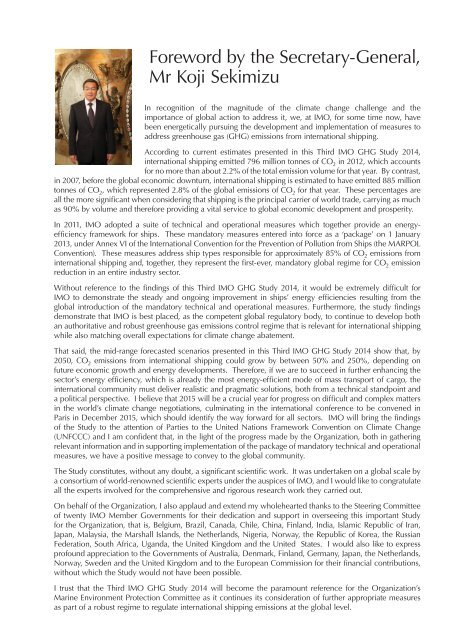MnrAq
MnrAq
MnrAq
You also want an ePaper? Increase the reach of your titles
YUMPU automatically turns print PDFs into web optimized ePapers that Google loves.
Foreword by the Secretary-General,<br />
Mr Koji Sekimizu<br />
In recognition of the magnitude of the climate change challenge and the<br />
importance of global action to address it, we, at IMO, for some time now, have<br />
been energetically pursuing the development and implementation of measures to<br />
address greenhouse gas (GHG) emissions from international shipping.<br />
According to current estimates presented in this Third IMO GHG Study 2014,<br />
international shipping emitted 796 million tonnes of CO 2 in 2012, which accounts<br />
for no more than about 2.2% of the total emission volume for that year. By contrast,<br />
in 2007, before the global economic downturn, international shipping is estimated to have emitted 885 million<br />
tonnes of CO 2 , which represented 2.8% of the global emissions of CO 2 for that year. These percentages are<br />
all the more significant when considering that shipping is the principal carrier of world trade, carrying as much<br />
as 90% by volume and therefore providing a vital service to global economic development and prosperity.<br />
In 2011, IMO adopted a suite of technical and operational measures which together provide an energyefficiency<br />
framework for ships. These mandatory measures entered into force as a ‘package’ on 1 January<br />
2013, under Annex VI of the International Convention for the Prevention of Pollution from Ships (the MARPOL<br />
Convention). These measures address ship types responsible for approximately 85% of CO 2 emissions from<br />
international shipping and, together, they represent the first-ever, mandatory global regime for CO 2 emission<br />
reduction in an entire industry sector.<br />
Without reference to the findings of this Third IMO GHG Study 2014, it would be extremely difficult for<br />
IMO to demonstrate the steady and ongoing improvement in ships’ energy efficiencies resulting from the<br />
global introduction of the mandatory technical and operational measures. Furthermore, the study findings<br />
demonstrate that IMO is best placed, as the competent global regulatory body, to continue to develop both<br />
an authoritative and robust greenhouse gas emissions control regime that is relevant for international shipping<br />
while also matching overall expectations for climate change abatement.<br />
That said, the mid-range forecasted scenarios presented in this Third IMO GHG Study 2014 show that, by<br />
2050, CO 2 emissions from international shipping could grow by between 50% and 250%, depending on<br />
future economic growth and energy developments. Therefore, if we are to succeed in further enhancing the<br />
sector’s energy efficiency, which is already the most energy-efficient mode of mass transport of cargo, the<br />
international community must deliver realistic and pragmatic solutions, both from a technical standpoint and<br />
a political perspective. I believe that 2015 will be a crucial year for progress on difficult and complex matters<br />
in the world’s climate change negotiations, culminating in the international conference to be convened in<br />
Paris in December 2015, which should identify the way forward for all sectors. IMO will bring the findings<br />
of the Study to the attention of Parties to the United Nations Framework Convention on Climate Change<br />
(UNFCCC) and I am confident that, in the light of the progress made by the Organization, both in gathering<br />
relevant information and in supporting implementation of the package of mandatory technical and operational<br />
measures, we have a positive message to convey to the global community.<br />
The Study constitutes, without any doubt, a significant scientific work. It was undertaken on a global scale by<br />
a consortium of world-renowned scientific experts under the auspices of IMO, and I would like to congratulate<br />
all the experts involved for the comprehensive and rigorous research work they carried out.<br />
On behalf of the Organization, I also applaud and extend my wholehearted thanks to the Steering Committee<br />
of twenty IMO Member Governments for their dedication and support in overseeing this important Study<br />
for the Organization, that is, Belgium, Brazil, Canada, Chile, China, Finland, India, Islamic Republic of Iran,<br />
Japan, Malaysia, the Marshall Islands, the Netherlands, Nigeria, Norway, the Republic of Korea, the Russian<br />
Federation, South Africa, Uganda, the United Kingdom and the United States. I would also like to express<br />
profound appreciation to the Governments of Australia, Denmark, Finland, Germany, Japan, the Netherlands,<br />
Norway, Sweden and the United Kingdom and to the European Commission for their financial contributions,<br />
without which the Study would not have been possible.<br />
I trust that the Third IMO GHG Study 2014 will become the paramount reference for the Organization’s<br />
Marine Environment Protection Committee as it continues its consideration of further appropriate measures<br />
as part of a robust regime to regulate international shipping emissions at the global level.


